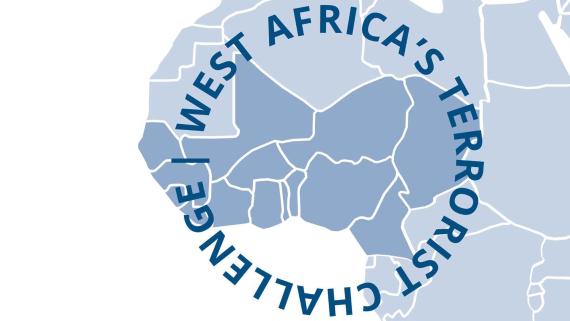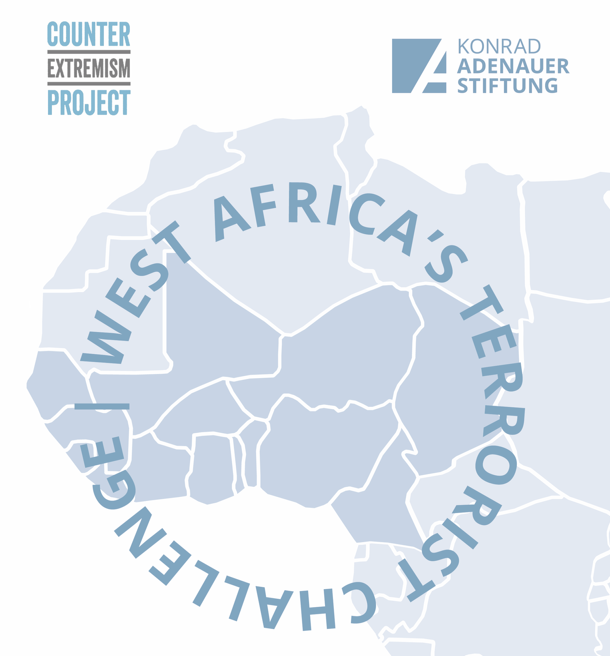Asset Publisher
“The Deteriorating Security Situation in West Africa”
A joint project of the Konrad-Adenauer-Stiftung and the Counter Extremism Project (CEP)
Asset Publisher
In West Africa, we can observe a steady decline in stability since several years with a simultaneous increase in the terrorist threat. Above all, the Jama'a Nusrat ul-Islam wa al-Muslimin' (JNIM), which is linked to al-Qaida, and the two branch organisations of the Islamic State (IS), IS West Africa Province and IS in the Greater Sahara, are steadily increasing their influence. For IS in particular, the African continent is becoming increasingly important. The Sahel region in western Africa is now the epicenter of global terrorism - in 2022, there were more terrorist related deaths here than in South Asia, the Middle East and North Africa combined (Global Terrorist Index 2023).
Within the region, terrorist groups and networks exploit ethnic differences and exacerbating violence between communities. They are also closely intertwined with transnational organised crime, complicating an already fragile situation. This evolving terrorist threat is exacerbated by political instability (e.g. military coups) and ongoing severe economic problems. This poses significant challenges for regional cooperation formats such as the Economic Community of West African States (ECOWAS), but also has implications - beyond the region - for Germany and Europe.
Threat to German and European interests
Germany and Europa have developed considerable engagement in the region. Increasing regional instability and growing terrorist structures pose an obvious threat to German interests in the region, while the interconnectedness of terrorism with transnational organised crime, including smuggling, human trafficking and illicit drug trafficking, also poses a clear threat to German and European security. Therefore, as part of the development of a new German security strategy, further German engagement in the region should be examined and potentially effective, new or enhanced formats for engagement should be explored.
“The Deteriorating Security Situation in West Africa” Project
In view of this growing threat, the Konrad-Adenauer-Stiftung and the Counter Extremism Project (CEP) have launched the joint project “The Deteriorating Security Situation in West Africa”. The aim of this project is to raise awareness of the relevance of these developments among political decision-makers in Germany and at the level of the European Union. The project focuses on security and counter-terrorism issues as well as the analysis of the deteriorating security situation in the region. The focus is on the question of what impact the spread of transnational terrorism has on the internal security of Germany and the European Union, as well as the derivation of targeted and operationally relevant recommendations for action for political decision-makers. The project includes the production of various papers as well as a weekly social media analysis, which monitors and evaluates the activities of relevant actors and terrorist networks in West Africa.
Strategy papers at a glance
The papers deal with different main topics: 1. Current status of terrorism threat, 2. Problematic external state actors, 3. Internal drivers of terrorism threat, 4. Effective countermeasures.
Current status of terrorism threat
The first topic deals with the current state of the terrorist threat in West Africa. It examines both the development of the most relevant terrorist actors and their growing links to transnational organised crime in West Africa. Furthermore, it will be examined whether (and which) links exist between regional terrorist groups in West Africa and other regions of sub-Saharan Africa.
- Development of al-Qaida in the region and current operational capabilities of JNIM
- Development of IS in the region and current operational capabilities of IS West Africa Province and IS in the Greater Sahara
- Linkage of regional terror groups (JNIM, IS West Africa Province and IS in the Greater Sahara) with terror networks outside the region (North Africa, Central Africa and East Africa)
- Interlinkage of terrorism and transnational organized crime in West Africa
Problematic external state actors that may drive terrorism threat
External actors also play a growing role in the West African security environment and must therefore be taken into account in current analyses and recommendations for action. The second topic therefore focuses on Russia and China as external actors and examines which developments and challenges arise from their growing presence in the region.
- Challenging external actors (Russia) and continued conflict in the region
- Challenging external actors (China) and continued conflict in the region
Internal drivers of terrorism threat
A sustainable and successful fight against terrorism is only possible if corresponding strategies also consider and include the underlying causes. Against this backdrop, the third thematic complex is dedicated to processes of inter-communal violence, political instability and economic deprivation in West Africa, which act as gateways for jihadist recruitment efforts and enable the spread of jihadist spheres of action.
- Intercommunal violence and terrorism in West Africa
Towards effective countermeasures
Effective countermeasures against the spread of terrorism and instability must involve the local, national and regional levels in order to be effective and sustainable. In this sense, the fourth thematic complex evaluates the different levels of impact as well as relevant existing actors at the regional level and finally describes what a renewed long-term German stabilisation and security strategy in West Africa should look like.
- Towards a renewed long-term German stabilization and security strategy in West Africa (recommendations jointly developed by CEP and KAS)
Social Media Monitoring
Various terrorist actors active in West Africa use social media for their external presentation as well as for propaganda and recruitment processes. Close monitoring and analysis of social media content can therefore provide important insights into their activities and strategic approach in the region. The project will produce weekly social media reports and monthly summaries.
December 2022 to February 2023
- 1st Report (1st to 8th December 2022)
- 2nd Report (9th to 16th December 2022)
- 3rd Report (16th to 23th December 2022)
- 4th Report (23th to 30th December 2022)
- 5th Report (30th December 2022 to 6th January 2023)
- 6th Report (6th bis 13th January 2023)
- 7th Report (13th to 20th January 2023)
- 8th Report (20th to 27th January 2023)
- 9th Report (27th January to 3rd February 2023)
- 10th Report (2nd to 9th February 2023)
- 11th Report (9th to 16th February 2023)
- 12th Report (16th to 23th February 2023)
- 13th Report (23th to 2nd March 2023)
March 2023 to May 2023
- 14th Report (2nd to 9th March 2023)
- 15th Report (9th to 16th March 2023)
- 16th Report (16th to 23th March 2023)
- 17th Report (23th to 30th March 2023)
- 18th Report (30th March 2023 to 6th April 2023)
- 19th Report (6th to 13th April 2023)
- 20th Report (13th to 20th April 2023)
- 21st Report (20th to 27th April 2023)
- 22nd Report (27th April to 4th May 2023)
- 23rd Report (4th to 11th May 2023)
- 24th Report (11th to 18th May 2023)
- 25th Report (18th to 25th May 2023)
- 26th Report (25th to 1st June 2023)
June 2023 to August 2023
- 27th Report (1st to 8th June 2023)
- 28th Report (8th to 15th June 2023)
- 29th Report (15th to 22th June 2023)
- 30th Report (22th to 29th June 2023
- 31st Report (29th June to 6th July 2023)
- 32ndReport (6th to 13th July 2023)
- 33rd Report (13th to 20st July 2023)
- 34th Report (20st to 27th July 2023)
- 35th Report (27th July to 3rd August 2023)
- 36th Report (3rd to 10th August 2023)
- 37th Report (10th to 17th August 2023)
- 38th Report (17th to 24th August 2023)
- 39th Report (24th to 31th August 2023)
September 2023 to December 2023
- 40th Report (31st August to 7th September 2023)
- 41st Report (7th to 14th September 2023)
- 42nd Report (14th to 21st September 2023)
- 43rd Report (21st to 28th September 2023)
- 44th Report (28th September to 5th October 2023)
- 45th Report (5th to 12th October 2023)
- 46th Report (12th to 19th October 2023)
- 47th Report (19th to 26th October 2023)
- 48th Report (26th October to 2nd November 2023)
- 49th Report (2nd to 9th November 2023)
- 50th Report (9th to 16th November 2023)
- 51st Report (16th to 23rd November 2023)
- 52nd Report (23rd to 30th November 2023)
- 53rd Report (30th November to 07th December 2023)
- 54th Report (07th to 14th December 2023)
- 55th Report (14th to 21st December 2023)
- 56th Report (21st to 28th December 2023)
- 57th Report (28th December to 04th January 2024)
January 2024 to March 2024
- 57th Report (28th December to 4th January 2024)
- 58th Report (4th to 11th January 2024)
- 59th Report (11th to 18th January 2024)
- 60th Report (18th to 25th January 2024)
- 61st Report (25th January to 1st February 2024)
- 62nd Report (1st to 8th February 2024)
- 63rd Report (8th to 15th February 2024)
- 64th Report (15th to 22nd February 2024)
- 65th Report (22nd to 29th February 2024)
- 66th Report (29th February to 7th March 2024)
April 2024 to May 2024
June 2024 to August 2024
Asset Publisher
Asset Publisher
Asset Publisher
Publications on this topic
 Konrad-Adenauer-Stiftung e. V.
Konrad-Adenauer-Stiftung e. V.
Interlinkage of terrorism and transnational organized crime in West Africa
Fourth Paper of the “The Deteriorating Security Situation in West Africa” project
-
Theo Clement, Dr Hans-Jakob Schindler
-
June 20, 2023
-
Single title
 Konrad-Adenauer-Stiftung e. V.
Konrad-Adenauer-Stiftung e. V.
Linkages of terrorist groups in West Africa with terrorist networks in other African regions
Third Paper of the “The Deteriorating Security Situation in West Africa” project
-
Ini Dele-Adedeji, Sofia Koller
-
June 19, 2023
-
Single title






